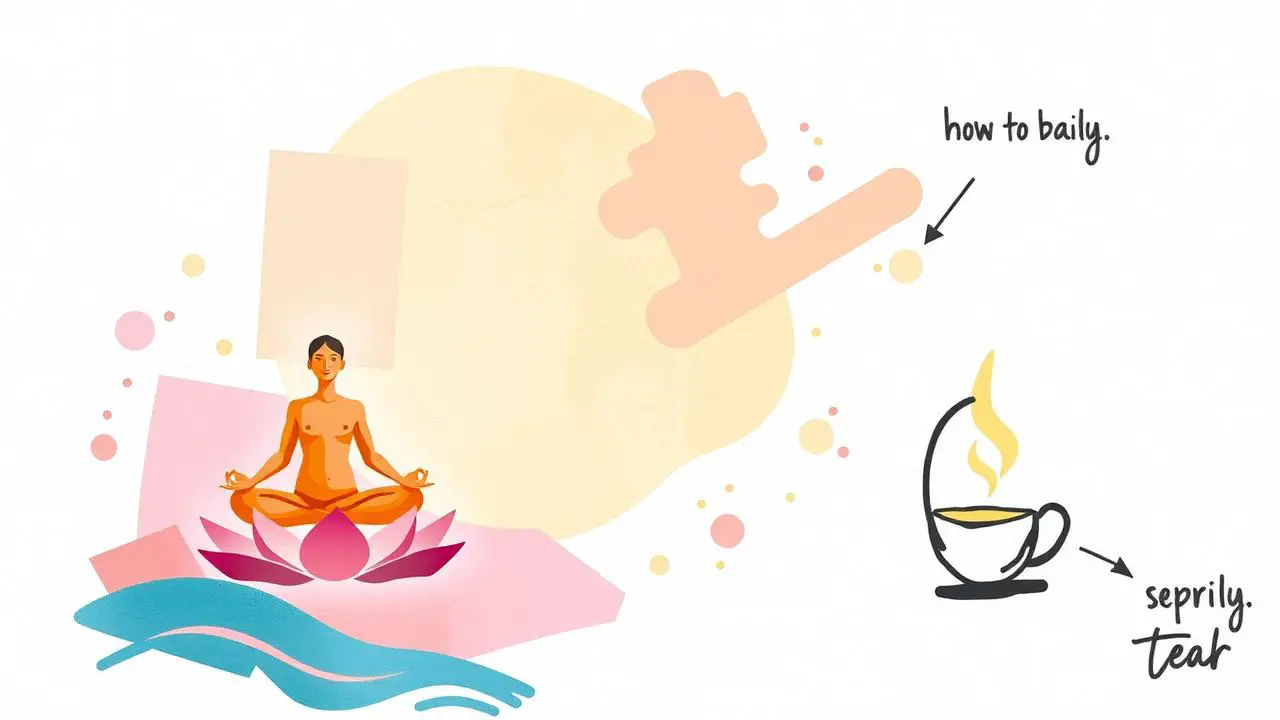Are you looking for a natural and effective way to improve your sleep? Have you considered trying meditation as a tool for better sleep?
Mindfulness meditation is a good meditation technique for improving sleep, as it helps focus the mind on being present rather than worrying about the past or future. Visualizations and body scans are also helpful for relaxation and calming the mind before sleep.
With its many benefits, including improved concentration, stress relief, and physical relaxation, meditation could be the perfect option for helping you get a good night’s rest.
Better sleep is a must for good health. Many strive for this goal. Meditation is an awesome way to reduce stress and relax your body, in turn improving sleep. Let’s take a closer look at how we can use meditation for better sleep.
What is Meditation?
Meditation is all about mindful awareness. It helps us connect with our inner selves. We focus attention on an internal or external stimulus, like a mantra or the present moment. The aim? To clear our minds of thoughts and worries.
Relaxation is different because we focus on one particular element. There are many types of meditation:
- Mindfulness
- Body scan
- Loving-kindess
- Visualisation
Each brings its own range of benefits.
Benefits of Meditation
Meditation has a long past as a spiritual practice, but also offers many physical and psychological advantages. Doing meditation often can reduce stress and anxiety, enhance mood and concentration, lessen blood pressure, improve sleep quality, create balance in emotions, and give clarity of thought and intuition. It’s a tool for positive change.
When meditating, attention is given to something like your breath or a mantra to get understanding of your highest truth. Through regular practice, stillness can be more easily reached. This lets us tap into an inner sanctuary more in our daily lives. If we access this state during tough times, better decisions can be made instead of being led by fear. The mind becomes clearer, increasing awareness which brings real strength in the present moment.
Types of Meditation
Meditation is a great way to get better sleep! It can help reduce stress and anxiety. There are multiple kinds of meditation – like mindfulness, mantra, and guided. In this article we’ll explore the types of meditation and how they help with sleep.
Mindful Meditation
Mindful meditation, also known as “insight” or “awareness” meditation, focuses on growing present-moment awareness. Practitioners learn to be in the present moment without judgement. Research reveals this can reduce stress and improve physical and mental health.
To meditate mindfully, sit calmly and focus on the breath. Notice any thoughts or feelings that arise. Observe them without judgement or attachment, and let them pass without reacting. This “detachment” can bring clarity and peace. In daily life, it helps to handle stressful situations with objectivity.
Guided Meditation
Guided meditation is a special form of meditation. It allows someone else to lead one’s thoughts and focus. Trusting them helps to relax, clear the mind and stay focused. Guided meditations may be audio programs or classes with an experienced instructor.
The goal of guided meditation is to bring the meditator into deep relaxation while they work on personal goals and objectives. The guiding voice in this type of meditation speaks from a place of knowledge and understanding. They use stories, anecdotes and metaphors to relate to life experiences in an extraordinary way.
Guided meditation is particularly helpful for those who can’t stay focused when meditating alone. The calming voice can guide beginners and help them avoid wandering off. It is also useful for those with insomnia. The soothing narrative helps one drift away from stressful thoughts and into a dream-like state. This can help reveal or work through subconscious issues.
Mantra Meditation
Mantra Meditation is an ancient practice, believed to be thousands of years old. It involves using sound to achieve inner calm and relaxation. We repeat a specific phrase silently in our minds. This could be “om” or “aham brahma asmi” (in yoga) or any phrase empowering to us – like “I am at peace“.
By repeating the sound, our focus shifts inward instead of outward on distractions like thoughts and noises. Over time, this creates new neural pathways. This can help with clearer thoughts, concentration and mindfulness. The goal is to focus on the mantra until sleep becomes possible.
Research in 2014 found that volunteers meditating for 15 minutes before bed felt less restless. There was no difference in quantity or quality of sleep compared to before the meditation. We need more research to confirm the benefits over long periods of time with repeated practice.
Breath Awareness Meditation
Breath awareness meditation is about focusing on the breath. Its purpose is to create a peaceful state, reduce stress, and boost emotional well-being. It involves observing physical sensations, movements, and pauses between breaths. Counting breaths and using words or phrases is also part of it.
This practice has many advantages:
- lower anxiety
- less tension
- better connection to yourself
- more alertness.
Furthermore, it can help those struggling with insomnia or difficulty falling asleep. It relaxes the mind before bedtime and promotes restful sleep.
How to Meditate for Sleep
Meditation is a helpful, easy tool for individuals looking to enhance their sleep. Studies show that having a consistent meditation practice can reduce tension, raise awareness, and assist in securing better sleep. In this article, we will explore how to meditate for sleep and learn how to include meditation as part of an effective sleep routine.
Set a Routine
Developing healthy sleep habits starts with a consistent pre-sleep routine. Before bed, do calming activities like reading a book or listening to soft music. Sit in a quiet space with minimal distractions. Take some deep breaths and then start meditating. Consistency is key. Practice meditation at the same time each night for your body and mind to get used to it.
Find a Comfortable Place to Meditate
Finding a spot for meditating is essential for peaceful sleep. Look for a quiet, dark room. Add pillows and cushions for comfort. Adjust the temperature to neither too hot nor cold. Turn off TVs and phones to avoid distractions. Don’t let strong odors linger; use an essential oil diffuser with lavender or chamomile. Preparation makes it easier to relax and drift into sleep.
Choose a Meditation Type
Choosing the right type of meditation for you is essential. Different techniques bring different results. Here are two of the most popular ones, for sleep:
- Mindfulness Meditation. This teaches you to observe your thoughts and how these affect your emotions and behavior. It helps you stay in the present. Focus on your physical sensations, environment or sounds. Mindfulness has a calming effect, aiding sleep quality.
- Guided Imagery Meditation. This technique relies on relaxation and visualization. A gentle voice will guide you through a special mental journey. Feel relaxed and comfortable. This makes you more in tune with your dreaming state before sleep. It helps relaxation before sleep occurs.
Focus on your Breath
Focusing on your breath is a popular and helpful way to meditate. The main goal is to help you relax and make it easier to fall asleep. Get in a comfortable position and shut your eyes. Focus on various body parts when inhaling and exhaling, like your chest. Just concentrate on the sensation of deep breathing without getting distracted by thoughts.
Draw each breath deeper than the last. Count to four while inhaling, hold for seven, and exhale for eight. This can slow down any worries that pop up in your mind right before bedtime.
This type of meditation trains your mind to stay in control when faced with strong emotions or distractions. Gradually move away from those thoughts until they no longer have power over you. This will help you peacefully relax before sleep and when having trouble sleeping at night.
Let Go of Unwanted Thoughts
If you can’t sleep due to tension, don’t worry about the “technique“. Focus on being aware and letting go. Thoughts come in like clouds. Just observe without reacting. Practice helps. The more you observe without reacting, the easier it is to let go.
Your mind can take control. Meditation for sleep shouldn’t be a chore. Play with your thoughts to reach deep relaxation.
When trying different techniques, focus on allowing thoughts and emotions to flow. Acknowledge their presence, observe without emotion and let them go. With regular practice, meditation for sleep becomes easier. It brings calming effects and enhances inner peace.
Conclusion
Meditating has been proven to be great for those suffering from insomnia and not-so-great sleep. Studies show that it can reduce stress and shorten the time it takes to fall asleep. With regular meditating, one can create a mental and physical environment that helps with a good night’s sleep.
In this article, we discussed the numerous benefits of meditation and how it may lead to a better sleep.
Summary of Benefits
Mindfulness meditation holds many benefits for better sleep. Its impact on mental and physical health can help reduce insomnia and improve restfulness. It increases concentration, reduces stress and anxiety, lessens fatigue during the day, normalizes sleep patterns, and lowers physiological arousal.
To make the most of it, set a consistent mindful practice schedule to create a healthy relationship with sleep. Focus on the breath and move your awareness from unhelpful thoughts to a calm state. Additionally, try:
- Setting regular bedtimes
- Limiting caffeine
- Exercising daily
- Avoiding evening snacks
- Limiting stimulants and alcohol before bedtime
Meditation can greatly improve one’s quality of life.
Final Thoughts
Meditating before bed can relax your mind and body, making sleep better. It can help manage the worries that come to mind at night. It can also reduce stress and anxiety, which can impact sleep.
However, it’s not a perfect solution for everyone. If it doesn’t improve your sleep quality, talk to a doctor or mental health professional.
Meditating could be the key to better sleep quality, and better health and wellbeing.
Frequently Asked Questions
Question 1: What is meditation good for?
Answer 1: Meditation is a great way to reduce stress, improve concentration, and even improve your overall physical and mental health. It can also be used to help with sleep, as it can help to relax the mind and body before bed.
Question 2: How can meditation help with sleep?
Answer 2: Meditation can help to create a calming and relaxing atmosphere in the mind and body that can be beneficial for falling asleep. It can also help to reduce stress and anxiety that can interfere with a good night’s sleep.
Question 3: What kind of meditation is best for improving sleep?
Answer 3: Mindfulness meditation is one of the best practices for helping to improve sleep. It involves focusing on the present moment and allowing thoughts to pass without judgement. It can be done before bed as a way to relax and unwind.




